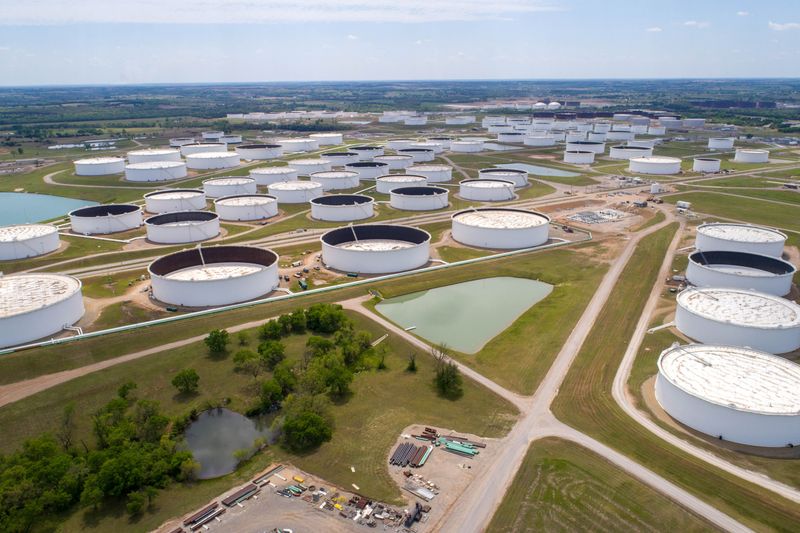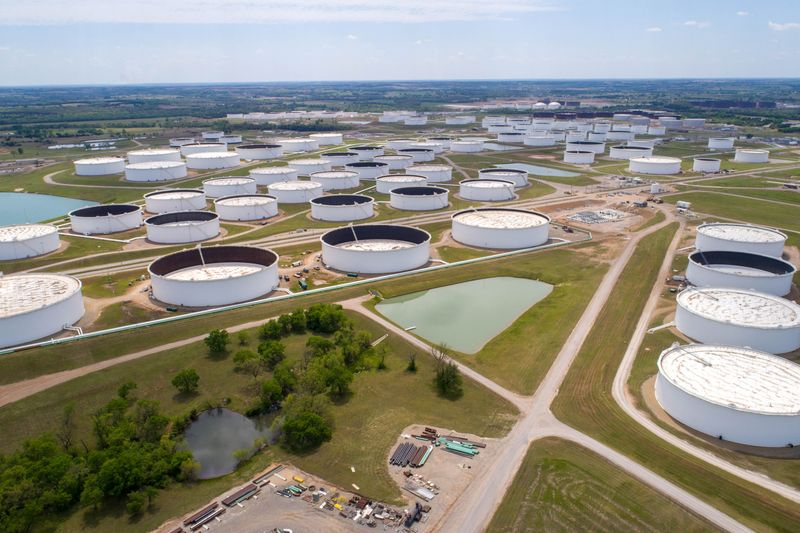Commodities
Oil prices gain around 1% as Red Sea tension persists


© Reuters. Crude oil storage tanks are seen in an aerial photograph at the Cushing oil hub in Cushing, Oklahoma, U.S. April 21, 2020. REUTERS/Drone Base/file photo
By Robert Harvey
LONDON (Reuters) -Oil prices rose as much as 1% on Friday as tensions persisted in the Middle East following Houthi attacks on ships in the Red Sea, although Angola’s decision to leave OPEC raised questions over the group’s effectiveness in supporting prices.
futures were up 71 cents, or 0.89%, to $80.10 a barrel at 1140 GMT ahead of Friday’s earlier 1230 GMT close ahead of the Christmas holiday weekend.
U.S. West Texas Intermediate crude futures were up 81 cents, or 1.1%, at $74.70 a barrel. At its intra-day peak, WTI traded $1 higher than Thursday’s close.
Both Brent and WTI futures were on track for a near 5% week-on-week gain, buoyed by rising geopolitical risks due to the Red Sea attacks and potential disruptions to shipping operations.
More maritime carriers are avoiding the Red Sea due to attacks on vessels carried out by the Houthi militant group, which says it is responding to Israel’s war in Gaza. The attacks have caused global trade disruptions through the Suez Canal, which handles about 12% of worldwide trade.
The United States on Tuesday launched a multinational operation to safeguard commerce in the Red Sea, but the Houthis said they would continue to carry out attacks.
“The longevity of impact on prices is completely dependent on the length of time that shipping companies continue to steer clear of the area. What has exaggerated such impact is the lack of clarity on how, where and when the so-called naval coalition will turn up,” PVM analyst John Evans said.
Despite the geopolitical tensions supporting oil, prices recorded day-on-day declines on Thursday as Angola announced it would leave OPEC.
The African nation – which produces around 1.1 million barrels per day of oil – said its membership of the organisation was not serving its interests, having protested against the decision by the wider OPEC+ group to reduce Angola’s output quota for 2024.
“This course of action has been rather predictable because of Angola’s attitude at the last OPEC meeting, nonetheless it brings into mind percolating divisions that might beset unity going forward,” PVM’s Evans added.
Commodities
Oil prices rise; U.S. crude inventories plunge, Russia-Ukraine truce eyed
Commodities
India’s Reliance to stop buying Venezuelan oil over US tariffs, sources say
Commodities
Oil prices climb on Venezuela supply worries

 Forex3 years ago
Forex3 years agoForex Today: the dollar is gaining strength amid gloomy sentiment at the start of the Fed’s week

 Forex3 years ago
Forex3 years agoUnbiased review of Pocket Option broker

 Forex3 years ago
Forex3 years agoDollar to pound sterling exchange rate today: Pound plummeted to its lowest since 1985

 Forex3 years ago
Forex3 years agoHow is the Australian dollar doing today?

 Cryptocurrency3 years ago
Cryptocurrency3 years agoWhat happened in the crypto market – current events today

 World3 years ago
World3 years agoWhy are modern video games an art form?

 Commodities3 years ago
Commodities3 years agoCopper continues to fall in price on expectations of lower demand in China

 Economy3 years ago
Economy3 years agoCrude oil tankers double in price due to EU anti-Russian sanctions























